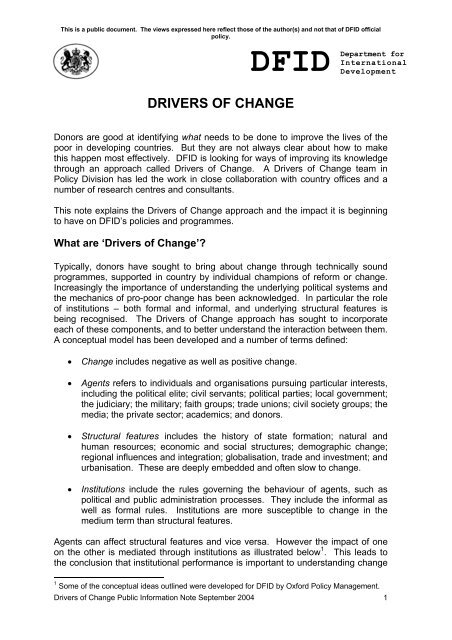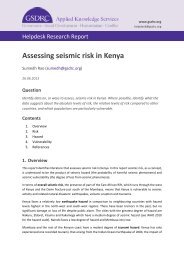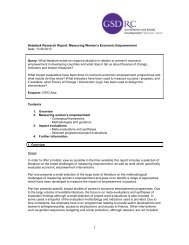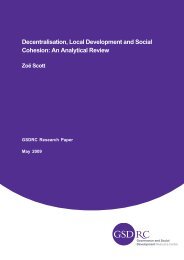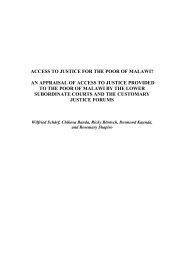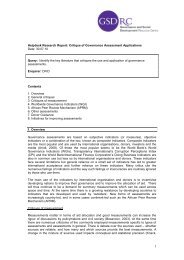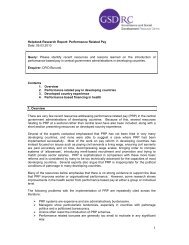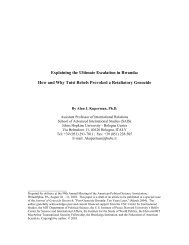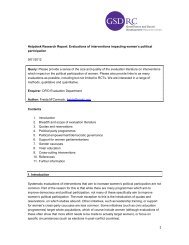DFID's 'drivers of change' - GSDRC
DFID's 'drivers of change' - GSDRC
DFID's 'drivers of change' - GSDRC
Create successful ePaper yourself
Turn your PDF publications into a flip-book with our unique Google optimized e-Paper software.
This is a public document. The views expressed here reflect those <strong>of</strong> the author(s) and not that <strong>of</strong> DFID <strong>of</strong>ficial<br />
policy.<br />
DFID<br />
Department<br />
for<br />
International<br />
Development<br />
DRIVERS OF CHANGE<br />
Donors are good at identifying what needs to be done to improve the lives <strong>of</strong> the<br />
poor in developing countries. But they are not always clear about how to make<br />
this happen most effectively. DFID is looking for ways <strong>of</strong> improving its knowledge<br />
through an approach called Drivers <strong>of</strong> Change. A Drivers <strong>of</strong> Change team in<br />
Policy Division has led the work in close collaboration with country <strong>of</strong>fices and a<br />
number <strong>of</strong> research centres and consultants.<br />
This note explains the Drivers <strong>of</strong> Change approach and the impact it is beginning<br />
to have on DFID’s policies and programmes.<br />
What are ‘Drivers <strong>of</strong> Change’<br />
Typically, donors have sought to bring about change through technically sound<br />
programmes, supported in country by individual champions <strong>of</strong> reform or change.<br />
Increasingly the importance <strong>of</strong> understanding the underlying political systems and<br />
the mechanics <strong>of</strong> pro-poor change has been acknowledged. In particular the role<br />
<strong>of</strong> institutions – both formal and informal, and underlying structural features is<br />
being recognised. The Drivers <strong>of</strong> Change approach has sought to incorporate<br />
each <strong>of</strong> these components, and to better understand the interaction between them.<br />
A conceptual model has been developed and a number <strong>of</strong> terms defined:<br />
• Change includes negative as well as positive change.<br />
• Agents refers to individuals and organisations pursuing particular interests,<br />
including the political elite; civil servants; political parties; local government;<br />
the judiciary; the military; faith groups; trade unions; civil society groups; the<br />
media; the private sector; academics; and donors.<br />
• Structural features includes the history <strong>of</strong> state formation; natural and<br />
human resources; economic and social structures; demographic change;<br />
regional influences and integration; globalisation, trade and investment; and<br />
urbanisation. These are deeply embedded and <strong>of</strong>ten slow to change.<br />
• Institutions include the rules governing the behaviour <strong>of</strong> agents, such as<br />
political and public administration processes. They include the informal as<br />
well as formal rules. Institutions are more susceptible to change in the<br />
medium term than structural features.<br />
Agents can affect structural features and vice versa. However the impact <strong>of</strong> one<br />
on the other is mediated through institutions as illustrated below 1 . This leads to<br />
the conclusion that institutional performance is important to understanding change<br />
1 Some <strong>of</strong> the conceptual ideas outlined were developed for DFID by Oxford Policy Management.<br />
Drivers <strong>of</strong> Change Public Information Note September 2004 1
This is a public document. The views expressed here reflect those <strong>of</strong> the author(s) and not that <strong>of</strong> DFID <strong>of</strong>ficial<br />
policy.<br />
processes and how they will impact upon the poor. For this reason DFID’s Drivers<br />
<strong>of</strong> Change analysis focuses on formal and informal rules, power structures, vested<br />
interests and incentives within these institutions.<br />
Structural<br />
Features Institu tio ns Agents<br />
What is the Drivers <strong>of</strong> Change Approach<br />
Drawing on the work <strong>of</strong> others, including that <strong>of</strong> other donors, the Drivers <strong>of</strong><br />
Change team has concluded that a single blueprint approach to Drivers <strong>of</strong> Change<br />
analysis is inappropriate. Instead, country <strong>of</strong>fices have been encouraged to ask<br />
themselves a structured set <strong>of</strong> questions about the dynamics <strong>of</strong> pro-poor change,<br />
loosely grouped into one <strong>of</strong> six levels:<br />
1. Basic country analysis – covering the social, political, economic and<br />
institutional factors affecting the dynamics and possibilities for change.<br />
2. Medium-term dynamics <strong>of</strong> change – covering policy processes, in particular<br />
the incentives and capacities <strong>of</strong> agents operating within institutions.<br />
3. Role <strong>of</strong> external forces – including the intentional and unintentional actions<br />
<strong>of</strong> donors.<br />
4. Link between change and poverty reduction – covering how change is<br />
expected to affect poverty and on what time-scale.<br />
5. Operational implications – covering how to translate our understanding into<br />
strategies and actions.<br />
6. How we work – covering DFID’s organisational incentives, including those<br />
promoting or impeding the retention <strong>of</strong> country knowledge.<br />
These levels and questions have been tested and are being refined through<br />
individual country studies led by country <strong>of</strong>fices with the support <strong>of</strong> the Drivers <strong>of</strong><br />
Change team. Most <strong>of</strong>fices have commissioned inputs from external consultants in<br />
the form <strong>of</strong> specific studies or literature reviews. Increasingly however, existing<br />
contextual knowledge found within country <strong>of</strong>fices is being used more effectively.<br />
And studies are increasingly involving national and international staff, <strong>of</strong>ten<br />
through the use <strong>of</strong> structured workshops. Initial country studies have focused on<br />
level 1 questions, with follow-up studies focussing on the remaining levels.<br />
Drivers <strong>of</strong> Change Public Information Note September 2004 2
This is a public document. The views expressed here reflect those <strong>of</strong> the author(s) and not that <strong>of</strong> DFID <strong>of</strong>ficial<br />
policy.<br />
In addition to the individual country studies and the resulting reports, a number <strong>of</strong><br />
services and products have or are being produced. These include:<br />
• A range <strong>of</strong> practical ‘how to tools’ providing advice on process and<br />
substance for country studies.<br />
• A number <strong>of</strong> tools and approaches to aid the understanding <strong>of</strong> Drivers <strong>of</strong><br />
Change in specific areas such as the budget process or policy formulation.<br />
• A training course and call-down facility to develop the ability <strong>of</strong> staff to<br />
incorporate this approach into their work.<br />
What difference has Drivers <strong>of</strong> Change made<br />
To date, over twenty DFID country <strong>of</strong>fices have completed or undertaking a<br />
Drivers <strong>of</strong> Change study. The benefits <strong>of</strong> the studies are already being felt. Here<br />
are some examples:<br />
• Making explicit and challenging the assumptions behind current<br />
programmes.<br />
• Making clear the extent <strong>of</strong> ‘political will’ for reform and determining the risk<br />
this posses to a programme’s success.<br />
• Prompting country teams to revise and <strong>of</strong>ten extend programme timetables<br />
to take account <strong>of</strong> the country context rather than DFID staff changes.<br />
• Identifying the role that the non-poor groups have in change processes, and<br />
suggesting collaboration with non-traditional partners.<br />
• Prompting a country team not to pursue a programme <strong>of</strong> work by providing<br />
the evidence that it is unlikely to succeed at present.<br />
• An additional, but major benefit, has been to enable staff from different<br />
disciplines and backgrounds to debate and share diverse perspectives.<br />
This has contributed to team building and enhanced goal sharing. It is<br />
anticipated it will also strengthen the institutional memory <strong>of</strong> <strong>of</strong>fices.<br />
How is DFID taking the Drivers <strong>of</strong> Change forward<br />
A critical mass <strong>of</strong> DFID country <strong>of</strong>fices has now developed the expertise to adopt a<br />
Drivers <strong>of</strong> Change approach. A database <strong>of</strong> consultants able to assist with studies<br />
has also been set-up. Against this backdrop, the Drivers <strong>of</strong> Change team will<br />
disband at the end <strong>of</strong> September 2004. Instead a Drivers <strong>of</strong> Change champion will<br />
take the agenda forward from within Policy Division’s newly forming Institutions<br />
and Political Systems team. The Drivers <strong>of</strong> Change Champion will continue to<br />
provide support to the country <strong>of</strong>fices on how to implement Drivers <strong>of</strong> Change<br />
studies. But increasingly the emphasis will shift to focus on assisting country<br />
<strong>of</strong>fices operationalise study findings. It is envisaged this will require greater<br />
collaboration with other UK government departments, other bilateral donors,<br />
including through OECD Development Assistance Committee’s Governance<br />
Network, and with the multilaterals.<br />
Where to go for more information<br />
If you wish to know more about Drivers <strong>of</strong> Change go to http://www.grcexchange.org/g_themes/politicalsystems_drivers.html<br />
, or contact Ann at a-<br />
freckleton@dfid.gov.uk.<br />
Drivers <strong>of</strong> Change Public Information Note September 2004 3


